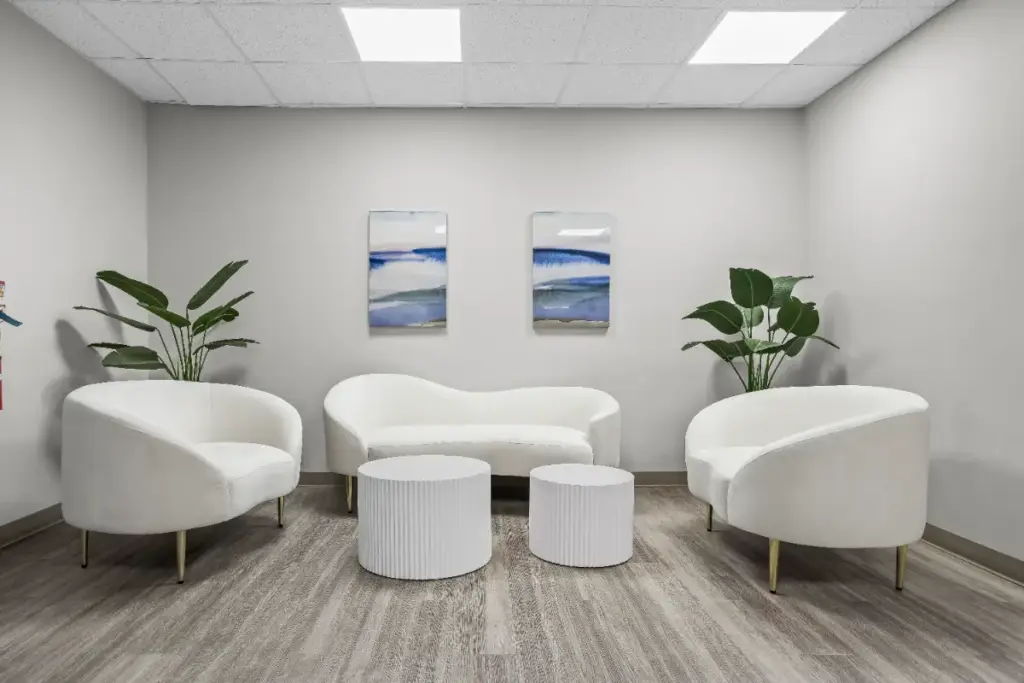The opioid crisis has also reached New Jersey (NJ) with the state losing nearly eight lives each day since 2018 to overdose deaths, most of which are linked to fentanyl.
This potent synthetic opioid has been detected in 98% of suspected opioid cases seized by New Jersey police. Between January 1st and May 1st of 2023, the state witnessed 1,144 suspected drug-related deaths. During that same period, emergency personnel administered Narcan (Naloxone) 6,176 times—averaging more than 40 daily administrations.
As the opioid epidemic continues to devastate families and communities across New Jersey, drug rehabilitation services represent a tangible path to recovery.
Table Of Contents:
New Jersey Substance Abuse Statistics
According to the New Jersey Department of Health and Senior Services, the state sees over 60,000 drug treatment admissions each year. Among these admissions, heroin remains the most commonly abused substance, accounting for 42% of cases, followed by cocaine at 13% and marijuana at 9%.
New Jersey experiences an average of 2,805 overdose deaths annually (increased at a rate of 11.81% over the last three years). The NJ overdose death rate is 31.7 per 100,000 residents— 53.14% higher than the national average. During the first five months of 2024, police and medics administered naloxone in 4,154 incidents—down from 6,176 during the same period in 2023.
These statistics exclude over 525,000 naloxone doses given to public institutions like universities and libraries. U.S. Senator Bob Menendez notes Narcan is now as common for first responders as attending to car accidents or burglar alarms. Additionally, while New Jersey has a low rate of alcohol-related deaths, it has experienced a 42.8% rise in the average annual excessive alcohol death rate between 2015 and 2019.
Drug Rehabs in NJ State
The National Survey of Substance Abuse Treatment Services (N-SSATS) shows that New Jersey has 383 active rehab facilities.
New Jersey offers a wide range of rehabilitation facilities dedicated to providing comprehensive care for individuals struggling with substance abuse and mental health disorders. These centers offer inpatient and outpatient programs, medical detox, dual diagnosis treatment, and specialized care.
With a commitment to evidence-based practices and holistic rehab, discover drug rehabs NJ below:
Inpatient Drug Rehab in New Jersey
There are 52 inpatient rehab facilities in New Jersey State that offer individuals struggling with addiction a structured and supportive environment where they can focus on recovery away from daily triggers.
These inpatient programs provide round-the-clock care and are designed to address the physical, psychological, and social aspects of addiction. Patients typically stay in these facilities for 30 to 90 days, but some rehabs in New Jersey may offer shorter or longer stays depending on individual needs.
Outpatient Drug Rehab New Jersey
If you need more flexible and adaptable addiction treatment, New Jersey has 343 outpatient rehabilitation programs. These programs enable individuals to get the help they need while still being able to live at home and fulfill their everyday responsibilities, such as work, school, or family obligations.
The intensity of these programs varies, with 250 of them operating as intensive outpatient rehab. This type of outpatient rehab requires at least 9 hours per week for a more robust level of addiction care. Additionally, 161 of these programs can provide methadone maintenance treatment.
Alcohol Rehab New Jersey
Alcohol addiction significantly contributes to the extensive issue of substance use disorders. Alcohol is involved in each of the four most commonly identified combinations of substance use disorders.
New Jersey is home to several alcohol rehab centers dedicated to assisting individuals in overcoming alcohol addiction. Many of these centers combine medical treatment with psychological therapy to address both the physical dependence on alcohol and the underlying causes of addiction.
There are 210 facilities for alcohol rehab in New Jersey offering dual treatment for drug and alcohol addiction, while 192 offer treatment exclusively for alcohol use disorder.
Detox Centers in NJ
Drug detox is the initial phase of recovery from substance abuse. It involves the process of eliminating harmful substances from the body under medical supervision. This is crucial as withdrawal symptoms can be severe and even life-threatening, especially for substances like alcohol, opioids, and benzodiazepines.
Drug detox in New Jersey typically takes place in a controlled environment, such as a rehabilitation facility, where medical professionals can monitor patients closely and administer medication to manage withdrawal symptoms. 20 drug detox centers in NJ offer inpatient drug detox services, while 37 offer outpatient detox services.
Mental Health Programs in New Jersey
Mental health conditions can often lead individuals to self-medicate with drugs as a way to manage distressing symptoms. Conversely, drug use can also trigger or exacerbate mental health issues.
Some substances can induce psychosis, with symptoms lingering for days or even weeks after use. Research indicates a heightened risk of developing a persistent psychotic disorder among those experiencing substance-induced psychosis.
Individuals facing both mental health challenges and substance abuse disorders need to address both conditions simultaneously. 207 facilities offer comprehensive treatment for co-occurring disorders that include rehab, medication, support groups, and psychotherapy.
Private NJ Drug Rehabs
In NJ, 271 drug rehabilitation centers accept private health insurance to help you afford substance use disorders.
Consider that the extent of drug rehab coverage depends on the specifics of your insurance plan and the policies of the rehab facility. It’s crucial to consult both your insurance provider and the rehabilitation center to fully grasp the scope of covered services, degree of coverage, potential expenses out of pocket, and whether any prior authorizations are needed.
Drug Rehabs in New Jersey That Accept Medicaid
New Jersey FamilyCare is the state’s Medicaid program, providing healthcare coverage to eligible low-income individuals and families.
This includes coverage for substance abuse treatment services. While specific coverage can vary based on individual eligibility and plan details, 239 facilities will accept NJ FamilyCare to cover a range of substance abuse treatment services.
Another option is Medicare, a federal health insurance program for people aged 65 or older, certain younger people with disabilities, and people with End-Stage Renal Disease (permanent kidney failure requiring dialysis or a transplant). While Medicare traditionally had limited coverage for substance abuse treatment, 114 rehab facilities in Oklahoma accept Medicare.
How Much Does Rehab Cost In New Jersey?
New Jersey ranks as the 15th most affordable state for residential drug rehab. Heroin addiction is the primary reason people seek treatment in the state.
On average, a patient attending an outpatient rehab program in NJ will likely pay around $1,701 for a 30-day treatment. Individuals opting for NJ inpatient drug rehab centers can expect an average expense of $56,570 for the same timeframe. There are 13 facilities for free drug rehab in New Jersey that provide drug rehabilitation treatment at no cost to all their patients.
New Jersey Rehab Insurance
Rehab insurance may range from limited to comprehensive, but most plans will cover at least some rehabilitation services. Insurers often limit coverage to specific rehab centers within their network. Yet, even within these in-network facilities, coverage may be limited to certain types of rehab and specific drug rehab lengths.
Fortunately, the Affordable Care Act (ACA), also known as “Obamacare,” signed into law by President Obama in March 2010, includes substance use disorders as one of the ten elements of essential health benefits. The act requires that health insurance plans sold on Health Insurance Exchanges or provided by Medicaid include addiction treatment services.
A list of the largest private companies that provide rehab insurance coverage is provided below:
- Aetna
- Amerigroup Insurance
- Anthem
- Blue Cross Blue Shield
- Humana
- Kaiser Permanente
- Kemper Direct (former Unitrin)
- Providence Health Plan
- State Farm Medical Insurance
- United Healthcare
15 Best Rehabs in NJ
We’ve compiled a list of best drug rehabs in NJ to guide your search. Each facility offers a unique approach to recovery, ensuring you can find a program tailored to your specific needs.
How to Choose New Jersey Alcohol and Drug Rehab?
Choosing the right addiction treatment program is crucial for long-term recovery. Here’s a guide to help you choose the best drug and detox centers New Jersey:
- Assess the severity of your addiction to determine the level of care you need (i.e., inpatient, outpatient)
- Going to therapy can help you identify if you also have a co-occurring disorder (i.e., depression or anxiety)
- Consider your personal preferences (i.e., structured environment vs. more flexibility)
- Learn about evidence-based treatments (i.e., cognitive behavioral therapy)
- Verify your insurance benefits and what your plan covers regarding addiction treatment.
- Look for reputable facilities with positive reviews and testimonials.
- Check accreditation by organizations like the Joint Commission or CARF.
- Consult with an addiction specialist for recommendations based on your specific needs.
- Choose a program that feels right for you.
Drug Rehab Centers in New Jersey – Bottom Line
New Jersey drug laws reflect its commitment to cut the spread of illegal substances. Possession of drugs like ecstasy, cocaine, or heroin can result in up to 5 years in prison, fines as high as $25,000, and mandatory drug counseling. You can lose your license if these substances are found in a vehicle.
As well in response to the escalating opioid crisis, New Jersey launched a program in January 2023, allowing residents as young as 14 to obtain naloxone (Narcan) free of charge and without a prescription at participating pharmacies. This initiative aims to reduce overdose deaths and provide lifesaving intervention.
If you or a loved one is struggling with addiction, reach out to a local rehab center and take the first step toward recovery and a healthier future.
People Also Ask
What is the law for drug possession in New Jersey?
Possession of federally scheduled drugs can result in up to 5 years in prison, $25,000 in fines, and mandatory drug counseling. If drugs are found in a vehicle, licenses may be revoked.
What are the best drug rehabs in New Jersey?
Renowned New Jersey drug and alcohol rehab facilities include Valley Spring Recovery Center Soba Recovery NJ, Turning Point Rehab Paterson, and Center for Network Therapy Middlesex NJ, offering comprehensive treatment programs for various addictions, including detox, inpatient, and outpatient services.
Does NJ Family Care cover rehab?
Yes, NJ Family Care covers drug and alcohol rehab, including inpatient, outpatient, and medication-assisted treatment, depending on the specific plan and treatment provider.
Hope Without Commitment
Find the best treatment options. Call our free and confidential helpline
Most private insurances accepted
Local Rehabs in New Jersey
Page Sources
- Senator Menendez Joins with Law Enforcement, Prevention Advocates, and Families to Announce Senate Passage of the FEND Off Fentanyl Act | U.S. Senator Bob Menendez of New Jersey. (2023, August 1). Robert Menendez. https://www.menendez.senate.gov/newsroom/press/senator-menendez-joins-with-law-enforcement-prevention-advocates-and-families-to-announce-senate-passage-of-the-fend-off-fentanyl-act
- Overview - New Jersey Drug Threat Assessment. https://www.justice.gov/archive/ndic/pubs0/669/overview.htm
- Biryukov, N. (2024, July 19). New Jersey drug deaths plummet in first half of 2024. New Jersey Monitor. https://newjerseymonitor.com/2024/07/19/new-jersey-drug-deaths-plummet-in-first-half-of-2024/
- Drug overdose death Statistics [2023]: Opioids, fentanyl & more. (2024, May 3). NCDAS. https://drugabusestatistics.org/drug-overdose-deaths/
- Alcohol Abuse Statistics [2023]: National + State Data - NCDAS. (2024, May 2). NCDAS. https://drugabusestatistics.org/alcohol-abuse-statistics/
- National Survey of Substance Abuse Treatment Services. (2021, July 14). https://www.samhsa.gov/data/data-we-collect/n-ssats-national-survey-substance-abuse-treatment-services
- Wu, T. (2021). Comorbid Substance Use Disorder Profiles and Receipt of Substance Use Disorder Treatment Services: A National Study. Journal of Studies on Alcohol and Drugs, 82(2), 246-256. https://doi.org/10.15288/jsad.2021.82.246
- Average Cost of Drug Rehab [2023]: by Type, State & More. (2024, May 2). NCDAS. https://drugabusestatistics.org/cost-of-rehab/
- Substance Abuse and the Affordable Care Act. The White House. https://obamawhitehouse.archives.gov/ondcp/healthcare







 FindTreatment.gov
FindTreatment.gov